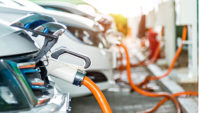California Offers $10-Million Grant for Electric Vehicle Charging Stations

A late July solicitation for proposals issued by the California Energy Commission will help complete the state’s portion of the West Coast Electric Highway from the Oregon border to Baja California.
By 2020, up to 1 million zero-emission vehicles will be able to travel the entire length of the state on electricity from fast-charging stations including those to be installed on nine highway corridors under this $10-million program.
California is acting to fulfill its commitment under the Pacific Coast Action Plan on Climate and Energy, an October 2013 agreement between the three coastal states and British Columbia to transition the region to clean modes of transportation.
Corridor charging will assure electric-vehicle owners that they can recharge when driving long distances along a freeway or highway with the charging infrastructure, California Energy Commission (CEC) officials explain.
Establishing an adequate charging infrastructure network will help to address “range anxiety,” the concern that an EV with an all-electric range of 75 miles might be unable to recharge. That anxiety is one of the prime concerns believed to influence consumer purchase and use of plug-in electric vehicles.
The competitive solicitation offers a total of $10 million in grants to install direct-current (DC) fast charging stations on Interstate 5, State Route 99 and U.S. Route 101. Bidders can bid on all nine target corridors or only on selected ones. Recipients of awards are required to pay a minimum of 25% in match funding on five of the corridors, but the other four have no match requirement.
EV Connect Inc., El Segundo, Calif., intends to propose for all nine corridors, says CEO Scott Jarus, “and in our proposal we’ll indicate that we think all of them should be awarded to a single provider so that there’s a consistency in the approach to the stations.” This is the biggest program EV Connect has done. It’s also a general-access system. “Most of the programs that we’ve done are on private networks for facility managers for enterprises,” Jarus says.
“DC fast-charging stations typically run $20,000-30,000, depending on the type of station that you’re putting in,” he says. That cost includes installation and related work. Installation time is likely to vary. “If there’s no remediation necessary by the utility to bring additional power there, a DC fast-charger unit can be installed in a matter of days. It’s simply a matter of setting the pedestal, the concrete, putting in the station and wiring it up.” Manufacturing of a large number of stations likely is the longest lead time. “You’re probably looking at a four- to six-week cycle for a station, but these will be done in parallel,” he says.
There are three types of charging stations, Jarus explains, and the DC fast-charging station is the top of the line. Level 1 runs on 110-volt power, is very slow and yields about three miles for every hour of charging. Level 2 is the most common type. It runs on 220-240V and yields 21-23 miles of driving per hour of charging. It is suitable for workplace or hospitality charging, “any place where a car is going to sit for four-plus hours,” he says. Topping off with a DC fast charger will take 20-30 minutes, he says. “Those are what they’re proposing to put along highway systems.”
ChargePoint Inc., Campbell, Calif., also is planning to propose for the project, but just obtained the documents in the last week of July and has not yet decided how many stations to propose, says Rich Quattrini, senior director of business development. “A lot of those locations are pretty important to us,” he says, but he doubts ChargePoint would go for the whole $10-million package.
ChargePoint is currently working with BMW and Volkswagen to install fast chargers on two corridors, one each on the East Coast and the West Coast. They are “very comparable” in scale and scope of work to the CEC project, Quattrini says. “We try to find locations that lead to quick install; we’re looking for locations that not only are appropriate for proximity to the highway, for amenities nearby, but also for ones that will minimize the cost of install and the amount of time of install.”
Projects require 480V, three-phase power supply—50 kW or 50 KVA, he notes. Quattrini defines a good location as one where both electrical infrastructure and 24-hour amenities are available and sufficient.
ChargePoint would contract out both the engineering design and the construction work, Quattrini says. EV Connect also subcontracts for the engineering, site work and electrical connection to a utility and would “probably not” use its own forces on this project, “because it’s larger than we could accommodate ourselves,” Jarus says.




